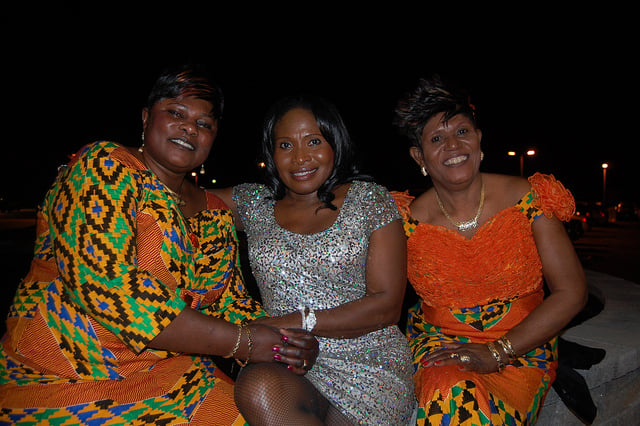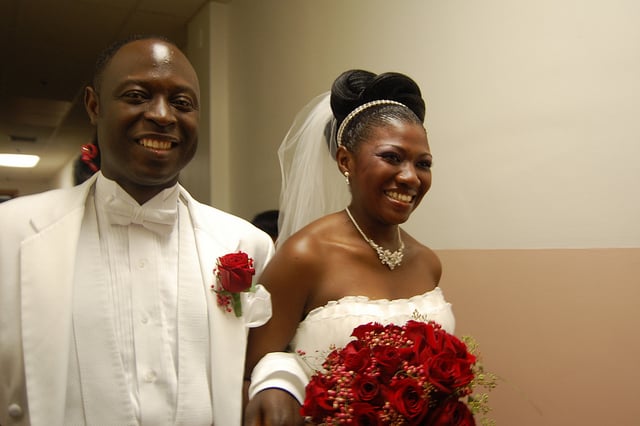
Fried chicken shops and overpriced pizza joints interspersed between fine dining restaurants and smoothie stores. A group of teenagers laughs loudly, pointing at something in the crowd. At one table, a young beggar asks for some food, as the family sitting there shoos her away while simultaneously bringing their shopping bags closer.
The Accra Mall food court is crowded, almost every table occupied with hungry shoppers. My friends — another orphanage volunteer named Stephanie and a local we met along our adventures named Michael — and I finally find some seats, although the tables are uncomfortably close, forcing us to press our backs against others as we eat.
Despite the fact Ghana is a very inexpensive country for most westerners, the Accra Mall food court is pricey, as you’ll find many of the capital’s business professionals and middle and upper classes spending their free time here. I’ve settled on an ultra greasy slab of chicken with a side of French fries; not quite my healthiest meal but it’s cheap and filling, especially compared to the fufu and rice water I’ve been living on for the past month.
Suddenly, amongst the chaos, my ears pick up on something strange. At the table across from me is a gorgeous Ghanian woman who appears to be in her 20s sitting with an attractive Ghanaian man wearing slacks and a dress shirt. In front of them the enticing glow of a McDonald’s illuminates their faces as dusk shadows the scene. Their demeanor suggests they’re on a first or second date, with slightly stiff body language and plastered-on smiles, but an easy banter going between them. I also hear him ask her if she has siblings, which suggests they don’t know each other well.
This is why I almost think I’ve misheard when the man turns to the woman — still seated in his plastic white chair — and asks the question every girl dreams of hearing (although usually not at a fast food join), “Will you marry me?”
Chicken grease dribbles down my chin, but I don’t bother to wipe it. I’m too enthralled with what’s playing out before me. It’s like I’m watching a real life version of The Bachelor, only instead of going to an ambient restaurant or having a fun experiential date the setting is the mall food court. Will she cry and say yes? Will she run away? Will she slap him in the face?
You can imagine my disappointment when the girl presses her hands to her mouth to suppress a small chuckle, shakes her head no, and continues chomping on her Big Mac.
Where was the fanfare? The string quarter that stealthily appears next to the table? The waiter running over with the complimentary bottle of Champagne? Also, why the hell would anyone propose at the mall, let along in the food court?!
I turn to Michael. “Please explain to me what just happened here.”
He laughs, as he’s aware of the big deal that goes into American wedding proposals and the length of time people in the U.S. date before getting married. “In Ghana it’s typical to propose after two or three dates. After that it’s seen as taking advantage of the friendship.”
Wow. I can’t help thinking to myself that, unlike American men (and women) who propose maybe one to three times in their lives, Ghanaians must propose dozens. According to Michael, it’s essentially based on what each can bring to the union.

Traditional Ghanaian wedding. Photo courtesy of imtfi.
Ghanian Marriage Traditions
Much has changed over the years, as in many communities the traditions revolving around Ghanaian marriages are becoming modernized, as locals move away from their villages, formal education becomes more important, outside religions influence the country, and certain influences from western culture seep in. According to Ghana Nation, in the past (and sometimes still) it was often tradition for a young man’s father to find him a suitable wife based on her medical history, criminal record and work ethic (the woman’s family would also look into the potential husband based on these criteria). If the families agreed it was a worthwhile arrangement, the bridegroom would give the bride’s family a gift, typically money and ti-nsa (head wine).
Another tradition is — mainly among Ewe communities — for the bridegroom’s maternal and paternal aunts to send the bride’s father a pot of palm wine, which is essentially a message asking if their nephew can have the daughter’s hand in marriage. After about a week or two in which the bride’s family researches the potential groom, the father will send his reply. From there, the groom’s parents will send the bride’s parents a pot of palm wine to thank them if there has been consent.
And in the North, it’s all about the gifts. If a man wants to marry a woman, he’ll start giving her gifts — for instance, money, hankerchiefs and towels. And if she accepts the gifts, this means she’s also accepting the proposal. Sometimes, the man will also send gifts to the bride’s family to show them his potential as a son-in-law.
Again, these traditions still occur, but less so as Ghana becomes more modernized — especially in the capital of Accra.

Dressed up for a Ghanaian wedding. photo courtesy of purplevintagespaceprincess.
Where It Gets Complicated
There’s more to marriage proposals in Ghana than just what’s been stated above. As any westerner that has visited the country has seen, it’s not uncommon to receive marriage proposals from locals every few days. In fact, during my time volunteering and traveling around Ghana, I met many visitors who took to wearing fake wedding rings in an attempt to make it stop.
After talking about the subject with locals I met along my journey, it became clear there was more to marriage proposals in modern times. While by nature local men don’t feel the need to wait years to propose to a girl as is typical in many western countries, they also see tourists as an opportunity. While Ghana is a beautiful country with a mountain- and waterfall-filled landscape, upbeat music adding positivity to the streets, and gorgeous handmade textiles in bold patterns, there is also a lot of government corruption and poverty. Not only would marrying a westerner give a local the opportunity to become more financially stable, but also the ability to pursue career talents not possible in Ghana. It made perfect sense, and gave me a different outlook on the “annoying marriage proposals” I had been receiving during my trip.

Bride and groom at a modern Ghanaian wedding. Photo courtesy of purplevintagespaceprincess.
Taking It Too Far
That being said, sometimes you need to be careful. I encountered one incident during my trip that was troubling. There was a 21-year-old man named Isaac I befriended who played on the local soccer team where I was doing a homestay, and I would get up early and run with him in the morning. During my time in Ghana I had made a few local male friends — like Michael — who I had become close with and who knew the boundaries of the friendship. Apparently, Isaac did not. He started coming over to my house more, not just for our morning runs but dropping by during the day and even sometimes after dark. I would make excuses that I wasn’t feeling well, and eventually started running at odd times to avoid him.
I had been volunteering at an orphanage during my stay, and all of us were doing the same homestay. One morning, another volunteer who knew Isaac turned to be and said, “So has Isaac mentioned his new charity to you?”
“I haven’t really talked to him,” I replied. “In fact, I’m avoiding him.”
“Well, he’s holding a benefit dinner for this new charity he supposedly started, and asked me donate money. Something tells me it’s made up. He was telling me yesterday how he wants to take you to a nice restaurant and buy you a gift, but I know he’s broke. Odd timing.”
It was odd timing. I began to ask around, even asking Isaac’s parents who were well-known in the community if they knew about a charity he was starting. They hadn’t, and neither had anyone else I asked. When I confronted Isaac about how I didn’t appreciate him making up a fake charity and asking my friends for money, it became apparent my intuition was correct.
“I just wanted to take you somewhere nice,” he responded. “I was hoping you could be my wife.”
While ultimately his intentions may have been good, it was a lesson in trust and how not everyone you meet — when traveling and at home — is what they seem. This is especially true when you visit a culture that’s very different from your own, as customs and traditions are often foreign from what you know.
Note: I want to make it clear I’m not trying to deter people from visiting Ghana, as it remains one of my top three favorite travel destinations (I’ve visited over 30 countries and countless cities). My goal with this piece is to give interesting insight into the marriage traditions of the country, as well as show through my experiences the importance of being aware, keeping your guard up, and trusting your gut when traveling.

Jessica Festa is the editor of the travel sites Jessie on a Journey (http://jessieonajourney.com) and Epicure & Culture (http://epicureandculture.com). Along with blogging at We Blog The World, her byline has appeared in publications like Huffington Post, Gadling, Fodor’s, Travel + Escape, Matador, Viator, The Culture-Ist and many others. After getting her BA/MA in Communication from the State University of New York at Albany, she realized she wasn’t really to stop backpacking and made travel her full time job. Some of her most memorable experiences include studying abroad in Sydney, teaching English in Thailand, doing orphanage work in Ghana, hiking her way through South America and traveling solo through Europe. She has a passion for backpacking, adventure, hiking, wine and getting off the beaten path.








